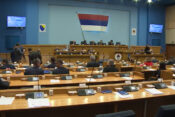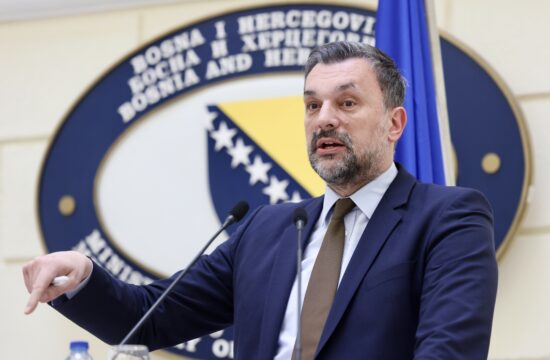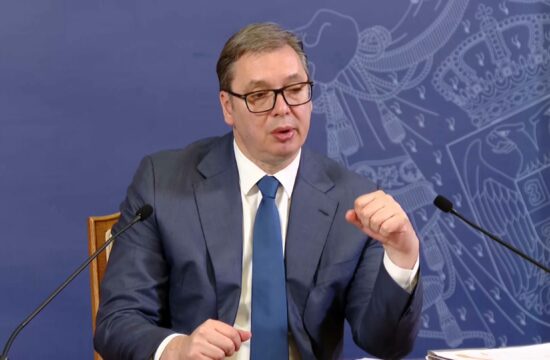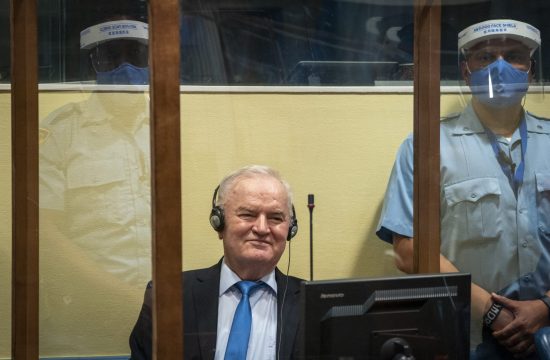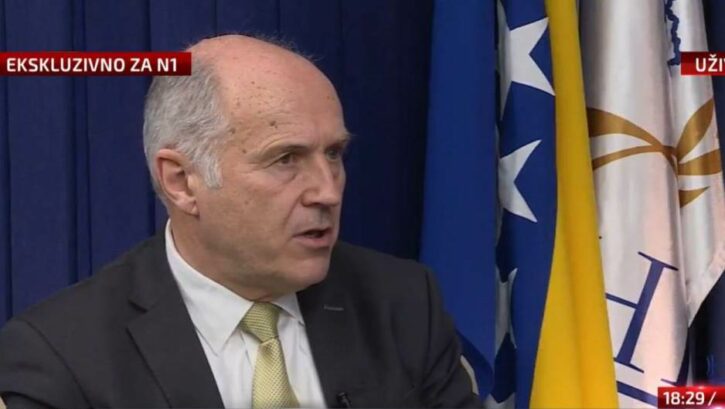
Bosnian Serb leader Milorad Dodik “crossed the red line” when he rejected a decision of the Constitutional Court but domestic institutions should first deal with the problem and if that does not work then it will be dealt with at the international community level, Bosnia’s international administrator told Al Jazeera Balkans on Thursday.
High Representative Valentin Inzko, an Austrian diplomat, is tasked with overseeing the civilian implementation of the 1995 Dayton Peace Agreement which ended Bosnia’s war and contains the Constitution. He made the statement in light of the latest political crisis in Bosnia and calls for him to use the so-called Bonn Powers – a mechanism that allows him to adopt and abolish laws and fire officials.
He said he agreed with the leaders of pro-Bosnian parties who said that Dodik had “crossed the red line” with his latest activities.
Last week, the Parliament of the semi-autonomous Republika Srpska adopted a set of conclusions including an instruction to all RS representatives in state institutions to stop participating in any decision-making processes until a law that would remove foreign judges from Bosnia’s Constitutional Court is adopted.
This means that state institutions are blocked. The move was initiated by Dodik and came after the Constitutional Court declared that public agricultural land in Republika Srpska should be owned by the state and not by the RS.
According to the Constitution, the Constitutional Court is composed of nine judges – two Bosniaks, two Croats, two Serbs and three foreigners. The foreign judges are named by the President of the European Court of Human Rights.
Dodik has been accusing the institution of working against Republika Srpska, arguing that the three foreign judges frequently side with the Bosniaks and outvote the Croats and the Serbs.
The Bosnian Serb leader has been mentioning the secession of the RS from Bosnia as a possible solution for the crisis. He said last weekend that there is no plan for such a move, but that “we aren’t excluding that option either.”
“The red line is then someone says that he will not respect the decisions of the Constitutional Court of Bosnia and Herzegovina, specifically, the latest one on agricultural land,” Inzko said.
“Imagine if someone in Corsica said they won’t respect decisions of the Constitutional Court in Paris. Macron would immediately send the army there,” he said, stressing that the Constitutional Court is “the foundation of every state and its decisions must be implemented.”
“It is due time for domestic institutions to do their job and if they don’t, there is always the possibility of us finding a common language on the level of the international community,” he stressed.
He argued that after Yugoslavia disappeared, Slovenia and Serbia inherited the deed on public land and so should Bosnia.
“The owner of state property must be the state,” he said.
The High Representative said he was prepared to use his Bonn Powers only if the Peace Implementation Council (PIC) – the international body composed of 55 countries and agencies supporting Bosnia’s peace process – would agree to it.
Inzko said that more and more PIC member countries are in favour of him using the Bonn powers but that no such decision has been made yet.
He explained that except for Russia – which traditionally sides with Bosnian Serb leadership – there are some other countries within the PIC that “believe domestic solutions to be the best,” but he would not name those countries.
The Quint countries (the US, the UK, Italy, France and Germany) have always been in favour of using the Bonn powers, he said.
Inzko also argued that Dodik was happy with the work of the Constitutional Court in some particular cases – such as when the names of particular towns were being changed and when it ruled that identification cards should include which entity people are from.
“So it is not true that the Constitutional Court only rules in favour of Bosniaks. Nearly 99 percent of those decisions were made unanimously,” he pointed out.
He added that the foreign judges can not be removed from the Constitutional Court with a new law but only through constitutional changes.



